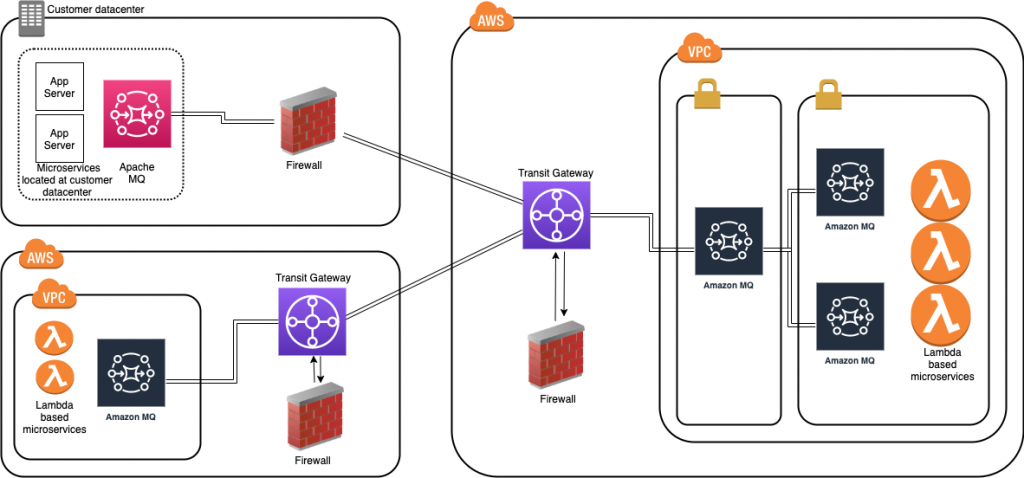AWS Compute Blog
Category: Amazon MQ
Using an Amazon MQ network of broker topologies for distributed microservices
This blog explains the choices when designing a cross-Region or a hybrid network of brokers architecture that spans AWS and your data centers. The example starts with a concentrator topology and enhances that with a cross-Region design to help address network routing and network security requirements.
Creating static custom domain endpoints with Amazon MQ for RabbitMQ
In this post, you build a highly available Amazon MQ broker in a private subnet. You layer security by placing the brokers behind a highly scalable Network Load Balancer. You configure routing from a single custom subdomain URL to multiple brokers with a built-in health check.
Authenticating and authorizing Amazon MQ users with Lightweight Directory Access Protocol
This post is written by Dominic Gagné and Mithun Mallick. Amazon MQ is a managed message broker service for Apache ActiveMQ and RabbitMQ that simplifies setting up and operating message brokers in the AWS Cloud. Integrating an Amazon MQ broker with a Lightweight Directory Access Protocol (LDAP) server allows you to manage credentials and permissions for […]
Using Amazon MQ for RabbitMQ as an event source for Lambda
Amazon MQ for RabbitMQ is an AWS managed version of RabbitMQ. The service manages the provisioning, setup, and maintenance of RabbitMQ, reducing operational overhead for companies. Now, with Amazon MQ for RabbitMQ as an event source for AWS Lambda, you can process messages from the service. This allows you to integrate Amazon MQ for RabbitMQ […]
Using Amazon MQ as an event source for AWS Lambda
Amazon MQ provide a fully managed, highly available message broker service for Apache ActiveMQ. Now Lambda supports Amazon MQ as an event source, you can invoke Lambda functions from messages in Amazon MQ queues to integrate into your downstream serverless workflows.
Implementing FIFO message ordering with Amazon MQ for Apache ActiveMQ
This post is contributed by Ravi Itha, Sr. Big Data Consultant Messaging plays an important role in building distributed enterprise applications. Amazon MQ is a key offering within the AWS messaging services solution stack focused on enabling messaging services for modern application architectures. Amazon MQ is a managed message broker service for Apache ActiveMQ that […]
Deploy and publish to an Amazon MQ broker using AWS serverless
If you’re managing a broker on premises or in the cloud with a dependent existing infrastructure, Amazon MQ can provide easily deployed, managed ActiveMQ brokers. These support a variety of messaging protocols that can offload operational overhead. That can be useful when deploying a serverless application that communicates with one or more external applications that […]
Migrating from IBM MQ to Amazon MQ using a phased approach
This post is contributed by Mithun Mallick, Solutions Architect and Christian Mueller, Solutions Architect Message-oriented middleware (MOM), or message brokers, are the backbone that integrates business critical applications in many industries. MOMs are used to integrate systems like inventory management, payment systems, and CRM systems. They are also used to orchestrate order-processing workflows across multiple systems, […]
Creating static custom domain endpoints with Amazon MQ to simplify broker modification and scaling
Update – Nov 9, 2021: AmazonMQ also supports RabbitMQ – read Creating static custom domain endpoints with Amazon MQ for RabbitMQ for more information This post is courtesy of Wallace Printz, Senior Solutions Architect, AWS, and Christian Mueller, Senior Solutions Architect, AWS. Many cloud-native application architectures take advantage of the point-to-point and publish-subscribe (“pub-sub”) model of message-based […]
Implementing enterprise integration patterns with AWS messaging services: point-to-point channels
This post is courtesy of Christian Mueller, Sr. Solutions Architect, AWS and Dirk Fröhner, Sr. Solutions Architect, AWS At AWS, we see our customers increasingly moving toward managed services to reduce the time and money that they spend managing infrastructure. This also applies to the messaging domain, where AWS provides a collection of managed services. Asynchronous messaging is […]









